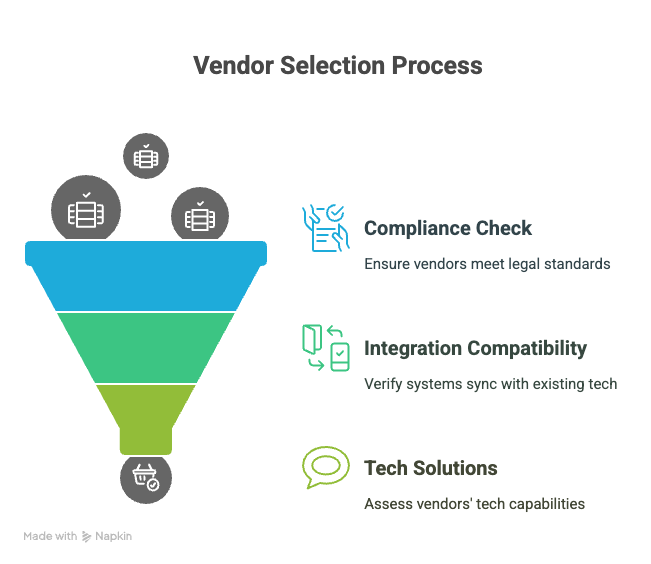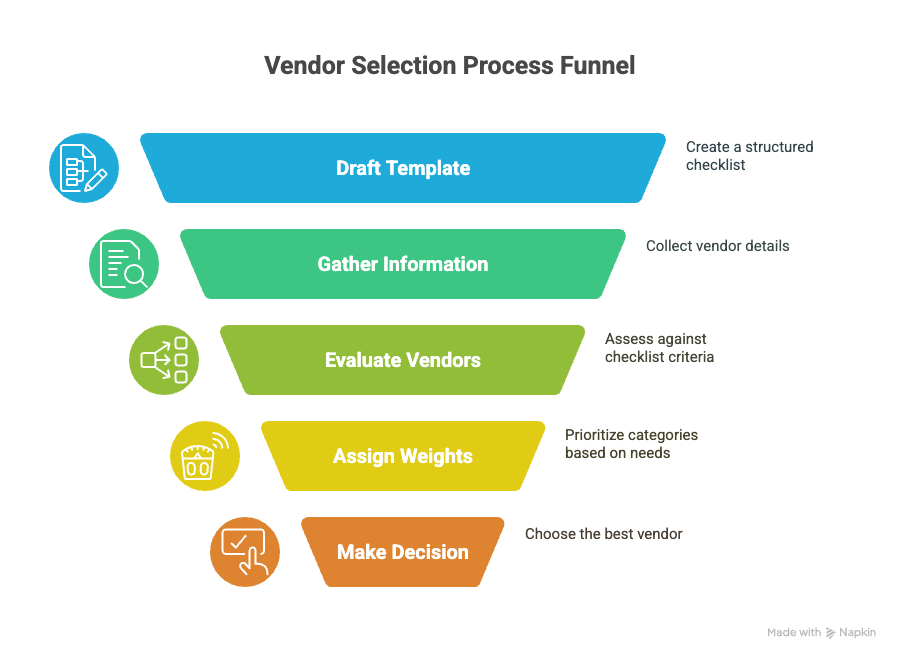In the fast-paced world of high-volume staffing, choosing the right background check vendor can be make-or-break for your business. With the constant movement of clients and candidates, ensuring you have a reliable background check process is crucial. But with so many vendors out there, how do you choose the right one? This guide aims to simplify that process by providing you with a detailed vendor vetting checklist tailored specifically for high-volume staffing firms.
Key Takeaways
- Ensure your background check vendor complies with federal and state regulations, like FCRA and EEOC, and has PBSA accreditation for legal adherence and data security.
- Seek vendors with platforms that integrate smoothly with your systems, offering user-friendly interfaces and employing automation for efficient processing.
- Look for a vendor that offers a variety of services, such as identity verification and criminal checks, and can customize these to meet your specific needs, prioritizing quick and accurate results.
- Compare pricing models to understand what youâre paying for and ensure you get good value for your investment without hidden costs.
- Research vendor reputation through client reviews and testimonials to gauge reliability, and ensure their customer support is prompt and helpful.
Introduction
Every high-volume staffing firm knows the critical role of background checks. It's not just about compliance, but about safeguarding your business and its reputation. When clients and candidates come and go rapidly, having a reliable process in place becomes crucial. This is where a structured vendor vetting process steps in. It ensures you choose a background check vendor who meets your needs and upholds your firm's standards.
The checklist introduced here is your tool for making these vendor evaluations efficient and effective. It highlights the main areas you should focus on when assessing background check vendors. Critical aspects include compliance with regulations, the technology they employ, the level of service they offer, their cost structures, and their reputation in the staffing industry.
Choosing the right vendor isn't just a box-ticking exercise. It's a strategic decision that can affect your firm's operational success. With this checklist, youâre armed to make informed choices that bolster compliance, enhance efficiency, and ensure reliability in your staffing operations.
Understanding Background Check Vendor Requirements
When you're navigating the sea of background check vendors, having a well-defined checklist is essential. This roadmap ensures you're not only compliant but also efficient and reliable. A robust checklist guides you in filtering out vendors that don't meet legal and operational standards, saving time and avoiding costly mistakes.
Compliance with federal and state regulations is non-negotiable. Vendors should align with standards from the FCRA, EEOC, and industry groups such as the Professional Background Screening Association (PBSA). Their accreditation speaks volumes about their commitment to legal standards, providing you with peace of mind.
Seamless integration with your current staffing systems and technology platforms should also be high on your list. Vendor systems need to sync efficiently with your existing tech tools, whether it's an Applicant Tracking System or a broader HRIS. This integration smooths out processes and avoids data bottlenecks, ensuring swift, comprehensive background checks.

In this rapidly moving field, you need vendors adept at simplifying complex procedures without sacrificing accuracy. The right ones will stand out by offering practical tech solutions with clear compliance adherenceâtwo pillars of a fruitful partnership.
Key Evaluation Criteria
When evaluating background check vendors for high-volume staffing, focus on five key areas: compliance, technological competency, service offerings, cost, and vendor reputation. Each of these plays a critical role in ensuring your staffing operations run smoothly and effectively.
Compliance and Legal Standards
Start by confirming that vendors meet necessary accreditation and certification requirements. Check if they hold credentials like the PBSA accreditation. This indicates they adhere to industry standards and maintain proper procedures. Additionally, ensure they comply with important regulations such as the Fair Credit Reporting Act (FCRA) and Equal Employment Opportunity Commission (EEOC) guidelines. Data security is another crucial aspect; vendors must have comprehensive measures in place to protect sensitive information.
Technological Competency
Examine the vendorâs technological capabilities closely. Their platform should be user-friendly and intuitive, which means you and your team can use it without complications. Consider if the vendor's system can integrate seamlessly with your existing Applicant Tracking System (ATS) or Human Resources Information System (HRIS). Automation and artificial intelligence are powerful tools that can quicken the screening process, reducing manual errors and saving time.
Service Offerings and Customization
Identify vendors offering a broad range of services, such as identity verification, criminal checks, and credit checks. Comprehensive service options are valuable because different positions may require varied screening types. Customization is also important; verify if the vendor can tailor their services to fit specific industry needs or unique requirements of your firm. Evaluate the expected turnaround time for completing checks and ensure accuracy is not compromised.
Cost Structure and Transparency
Evaluate the vendorâs pricing models for clarity and fairness. Some vendors offer pay-per-check models, while others may use subscription-based systems. Conduct a cost-benefit analysis to see which option aligns best with your firmâs budget and service needs. Consider both immediate and long-term financial impacts, alongside the quality and depth of services rendered.
Vendor Reputation and Client Feedback
Lastly, investigate the vendorâs reputation in the industry. Look for client reviews and testimonials, which can provide insights into the vendorâs performance and reliability. Check if they have any industry recognitions or awards. Also, evaluate the quality of their customer support, noting how responsive and helpful their team is when issues arise.
By focusing on these factors, you ensure that the vendor you choose not only meets your current needs but can also adapt to future ones. Your choice of technology can be a competitive advantage, facilitating faster placements and keeping your operations running smoothly.
Compiling Your Screening Provider Checklist
Creating a checklist for evaluating potential background check vendors is a strategic step in refining your selection process. Start with defining clear categories that reflect your firm's needs: compliance, technology, services, cost, and vendor reputation. This structure will guide you in gathering the necessary information efficiently.
To begin, draft a template that outlines these categories. For compliance, include items like verifying FCRA compliance and checking for PBSA accreditation. In technology, focus on integration capabilities with your ATS or HRIS. Under services, list the specific background checks you require. For cost, ensure clarity in comparing pricing models. Finally, in reputation, prioritize gathering client reviews and exploring the vendor's history in the industry.
When using your checklist, aim for consistency in evaluating each vendor. Assign weights to different categories based on your priorities. For example, if fast turnaround times are crucial, give that more significance in your decision matrix. Consistent application of your checklist will enable an objective comparison and lead to a more informed choice.

Remember to update your checklist as your business needs evolve or as industry standards change. A well-maintained checklist becomes an invaluable tool, supporting decision-making that aligns closely with your strategic goals.
Implementation and Onboarding
Trial periods are like test drives. Before committing to a vendor, you need to see how their service performs in real-world conditions. A trial period lets you experience their support, response times, and accuracy. Are they as fast as claimed? Is their system truly user-friendly? Use this trial time to check these factors. It reveals if they can meet your specific needs and handle the volume of checks you require.
Once you choose a vendor, focus on smooth onboarding. Comprehensive training is crucial. Your team should know the new system inside out. Scheduling regular training sessions can ease this process. Consider appointing a dedicated contact person on each side. This ensures faster issue resolution and enhances communication. Does the vendor offer ongoing support? This is something you'll want to verify before integrating their services.
Building a long-term partnership with your vendor can add value. Look beyond the initial setup. A good vendor will keep their technology and methods up-to-date, providing new features and improved services. Check if they offer regular updates or client briefings. This keeps your firm competitive and responsive to changes in the industry.
Overall, invest the time to properly evaluate potential partners through trials, training, and understanding their long-term value. This effort now can prevent headaches down the road and guarantee that you get the most reliable and effective service possible.
References
Streamlining your operations and maintaining compliance require the right internal resources. Here are some tools that can help you keep your processes efficient.
Staffing Compliance Tools: These resources ensure you adhere to legal standards and regulations. They help you organize and track compliance across your operations. Look for tools that integrate compliance reporting and provide updates on regulatory changes. This integration reduces risk and saves time.
Process Management Software: Choose software that allows for easy tracking and management of your staffing processes. These tools aid in organizing workflows and identifying bottlenecks. This software can increase your team's productivity by making task management transparent and efficient.
Learning Management Systems (LMS): Implement an LMS for continuous staff training and development. It can deliver compliance training, ensure everyone is up-to-date on policies, and track progress. Itâs a vital resource for keeping your team aligned with industry practices.
Common Background Check Questions: This resource addresses typical queries in background checks. It helps staff understand procedures and sets clear expectations for clients. By referring to this regularly, youâre better prepared to answer client questions, improving satisfaction and trust.
Utilize these tools to bolster your internal processes, staying efficient, compliant, and responsive to industry demands. With the right resources, you enhance your staffing firm's capability to handle complex challenges with ease.
Conclusion
Evaluating a background check vendor can significantly impact your staffing firm's success. Hereâs what you need to focus on:
First, compliance and legal standards. Vendors must adhere to federal and state regulations. Verify accreditations like PBSA, and check if they follow FCRA and EEOC guidelines. They should have strong data security measures to protect sensitive information.
Next, technological competency matters. A user-friendly platform is essential, but so is integration with your existing ATS or HRIS. Automation in screening processes can streamline operations, saving you time and reducing errors.
Service offerings should be diverse. Look for vendors providing services like identity verifications, criminal and credit checks. Flexibility and customization capabilities ensure they can tailor solutions to fit your specific needs. Quick turnaround times and accuracy in reports are crucial for maintaining efficiency in high-volume staffing.
Cost transparency is another factor to consider. Compare pricing models and weigh them against the services offered. A cost-benefit analysis will help you identify if you're getting value for money.
Finally, reputation and client feedback are valuable indicators. Review testimonials and case studies. Industry reputation can be a reliable gauge of a vendorâs reliability and performance. Evaluate the quality of their customer support, as responsive and capable support is essential in maintaining operations.
Approaching vendor selection with these criteria in mind will guide you in making an informed choice. Itâs about ensuring your staffing process is backed by a reliable partner, improving not just compliance but overall efficiency and client satisfaction.
Frequently Asked Questions (FAQs)
What should I look for in a background check vendor for high-volume staffing?
Look for fast turnaround times to keep your hiring process efficient. Ensure the vendor offers scalable solutions to handle your volume. Check for a user-friendly platform that integrates with your existing HR systems. Verify their experience in handling high-volume requests and consistent service across larger scales.
What questions should I ask a background screening provider?
Ask about their turnaround time for different types of checks. Inquire about their compliance measures with federal and state regulations. Request information on their data security protocols. Clarify their policies on resolving disputes and handling discrepancies in background information.
How do I compare background check vendors?
Compare the range of services each vendor offers. Look at pricing models to identify cost-effective options. Check customer reviews and testimonials for reliability. Assess their compliance track record to ensure adherence to legal standards.
What is PBSA accreditation and why does it matter?
PBSA accreditation indicates that the provider meets high standards of accuracy and integrity in background screening. This accreditation is a mark of quality as the PBSA audits and regulates its members to ensure they follow best practices, giving you confidence in their processes.
How can I ensure compliance with background checks at scale?
Ensure your vendor stays updated with changing laws. Implement policies and training for consistent practices across your organization. Use technology to automate checks and maintain records. Choose a vendor with a proven compliance track record.
What kind of customer support can I expect from a background check vendor?
You need 24/7 support for urgent issues. Check for dedicated account managers who can provide personalized assistance. Ask about their training resources for using their platform effectively.
How can I ensure data security with a background check vendor?
Verify the vendor uses encryption and secure servers to protect data. Request their data handling and storage policies. Ensure they comply with regulations like GDPR if applicable. Check for third-party audits or certifications attesting to their security practices.
What is the average turnaround time for background checks?
Ask for specifics on each type of check. Some checks, like criminal records, may return results within hours, while others, like education verification, could take days. Understand variants in different regions or countries to manage expectations.
How do background checks integrate with applicant tracking systems?
Confirm if the vendor's platform seamlessly integrates with your current HR systems. Look for APIs that facilitate smooth data flow. Check if they offer training on integration processes for ease of use.
What happens if there is a dispute regarding background check results?
Understand the vendor's dispute resolution process. Ask how they handle rechecks and resolve inaccuracies. Ensure they have a transparent process to correct any errors quickly.
Definitions
Compliance
Compliance refers to how well a background check vendor follows federal, state, and industry-specific regulations. Look for alignment with laws like the Fair Credit Reporting Act (FCRA) and Equal Employment Opportunity Commission (EEOC) guidelines. Also, check for accreditations such as PBSA certification. This helps reduce legal risks and builds trust with clients and candidates.
Applicant Tracking System (ATS)
An Applicant Tracking System is a software that helps you manage the recruitment process. It stores candidate data, tracks job applications, and automates common hiring tasks. When evaluating vendors, ask if their platform can integrate with your ATS. This ensures smooth operations and less manual work for your team.
Human Resources Information System (HRIS)
A Human Resources Information System is a digital hub for all your HR data and processes. It includes employee records, payroll, benefits, and more. Picking a vendor whose system syncs with your HRIS helps maintain consistent data across platforms. This reduces errors and improves decision-making.
Turnaround Time
Turnaround time refers to how quickly a vendor delivers completed background checks. In high-volume staffing, delays can disrupt hiring timelines. Ask for specific timeframes on different check types, such as criminal records or employment verifications. Fast, reliable results help you fill positions without slowing down.
Customization
Customization means a vendorâs ability to adapt their services to match your specific hiring needs. Whether you need credit checks for financial roles or faster ID verification for temporary hires, a vendor should offer flexible options. Personalized services can lead to better fit between the vendor and your staffing goals.
References
- S2Verify Ultimate Checklist:
https://s2verify.com/resource/evaluate-background-screening-vendors/ - Asurint Vendor Assessment Checklist:
https://asurint.com/resource-center/blog/may-2025/screen-your-screener-vendor-assessment-checklist - Staffing Industry Analysts Background Check Best Practices:
https://www.staffingindustry.com/editorial/cws-30-contingent-workforce-strategies/candidate-screening-background-check-best - backgroundchecks.com Staffing Company Resource:
https://www.backgroundchecks.com/learning-center/using-background-checks-at-staffing-companies

GCheck Editorial Team
Meet the GCheck Editorial Team, your trusted source for insightful and up-to-date information in the world of employment background checks. Committed to delivering the latest trends, best practices, and industry insights, our team is dedicated to keeping you informed.
With a passion for ensuring accuracy, compliance, and efficiency in background screening, we are your go-to experts in the field. Stay tuned for our comprehensive articles, guides, and analysis, designed to empower businesses and individuals with the knowledge they need to make informed decisions.
At GCheck, we're here to guide you through the complexities of background checks, every step of the way.





